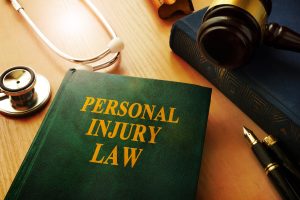
It is always tragic when somebody is seriously injured, but it is especially upsetting when that injury is the result of another party’s negligence. Serious injuries can result in financial and emotional hardships in addition to obvious physical pain. Thankfully, personal injury lawsuits provide a legal pathway for victims to pursue compensation for their injuries. If you are ever injured because of someone else’s negligence, you will need to understand your legal options before pursuing a lawsuit or other action. The personal injury law experts here at The Law Office of Andrew S. Maze have compiled a guide to personal injury lawsuits so you can be prepared.
Basics of Personal Injury Lawsuits
Personal injury lawsuits are legal disputes in which one party/person might be legally responsible (liable) for the accident or injury of another. An injured party can file a lawsuit against the party they believe is liable for their injury in order to pursue monetary compensation and benefits. Personal injury cases start when a private individual, the plaintiff, files a civil complaint against another party, the defendant, alleging that their actions caused them injury. Personal injury lawsuits are civil cases initiated by private actors, not criminal cases initiated by governments against people for breaking laws.
Personal injury disputes lead either to formal lawsuits or informal settlements to rectify the situation. The amount of compensation available, statutes of limitation, and other details of the process are determined by the type and complexity of the personal injury lawsuit being litigated.
Types of Personal Injury Lawsuits
There are numerous types of personal injury lawsuits, some of which overlap, but many of them can be grouped under the umbrella categories of premise liability and auto-accident/transportation. Premise liability cases occur when a property owner is negligent in maintaining safe conditions on their property, leading to someone else’s injury. Examples of premise liability cases include residential premise liability cases, parking lot accidents, supermarket accidents, snow & ice accidents, municipal accidents, hotel accidents, and sidewalk accidents. In these types of cases, the victim’s legal representation must argue that the property owner failed in their duty of care and caused the victim’s injury through negligence.
Auto-accident/transportation personal injury lawsuits are cases in which somebody was injured during an accident involving cars or another mode of transportation. Examples of this type of personal injury lawsuit include general car accidents, pedestrian accidents, truck accidents, mass transit accidents, bicycle accidents, motorcycle accidents, and drunk driving accidents.
There are also other types of personal injury cases that do not necessarily fit either of these categories, like workplace accidents, dog bite cases, product liability, medical malpractice, and more.
How Personal Injury Lawsuits Are Filed
Every personal injury lawsuit follows the same basic process. It is important to have expert legal representation at every step in this process. It is also important to note that the two sides can decide to settle the dispute at any point.
Filing a Complaint
The first step in beginning a personal injury lawsuit is filing a complaint with the court. The complaint will detail your allegations against the defendant and the damages you are seeking. The complaint will also include a summons notifying the defendant of the lawsuit and the amount of time they have to respond.
Serving
The second step is that the complaint and summons need to be served on the defendant at your expense. The defendant is either served by a process server, a sheriff, or a constable, depending on the local jurisdiction. Ask your lawyer for further information on your specific case.
Defendant’s Answer
After you file a complaint, the defendant will file a response with the court. The response will either deny all or some of the allegations made in your complaint. The response will also detail the defenses the defendant plans to utilize in court.
Discovery
Next, both sides of the case will start exchanging relevant documents in a legal process known as discovery. Each side will request relevant documents and information regarding the case from the other side. Items such as witness statements, medical records, financial documents, and more will be exchanged between the two sides. Discovery can take months or even years.
Settlement Conferences
If the two sides do not come to a settlement before this step in the case, both will attend a settlement conference and try to come to an agreement. In some jurisdictions, mediation or arbitration may also occur at this step. If these settlement conferences fail, the case will then go to trial. However, according to the U.S. Department of Justice statistics cited by Forbes, only 4% to 5% of personal injury cases go all the way to trial. That’s why it is important to have strong legal representation at every step of this process, not just in the unlikely event that your case actually goes to trial.
Law Office of Andrew S. Maze Can Help
If you have suffered a personal injury because of another party’s negligence, you may be able to successfully sue for compensation. Still, you will need an experienced and compassionate legal team to protect your interests. If you have been injured, please contact The Law Office of Andrew S. Maze so that we can help protect your interests!